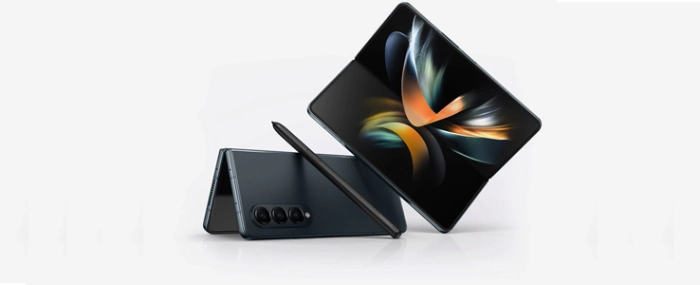
Market penetration rate of OLED folding phones to reach 1.1% in 2022
According to TrendForce, as technology and materials evolve, the penetration rate of OLED folding mobile phones is estimated to reach 1.1% in 2022.
Release of New Brand Flagships Expected to Drive Market Penetration Rate of OLED Folding Mobile Phones to Approximately 1.1% in 2022, Says TrendForce
While mobile phone brands successive launch new flagship folding devices, penetration rate is expected to exceed 2.5% post-2024 driven by improved specifications and increasingly competitive pricing. In addition, there is an opportunity to provide a breath of fresh air to a market steeped in sluggish consumer sentiment led by inflation and drive folding mobile phones into the mainstream.
In response to the successive launch of new phones by Samsung, Xiaomi, and Motorola, TrendForce analyzes the foldable model from three aspects: construction, specifications, and technology. According to usage preferences, mobile phone types can be divided into easy to carry, vertical flip-top folding, and horizontal folding that can act as small tablets when unfolded. In terms of construction, there is the inward fold that requires an extra secondary screen and the outward fold that is lighter in weight but exposes the screen to the risk of scratches. Although the outward folding radius is larger, the mechanical performance of the module and hinge design is very challenging and, since the screen is exposed, it must be kept in close contact with the hinge at every angle. The radius for inward folding screens is smaller, though compressive stress is greater, which promotes creases and related reliability issues. However, according to general usage habits, if an inward fold can effectively reduce weight and eliminate creases, coupled with the advantage of the screen being protected by the mobile phone case, this type of device would be more likely to be popular with consumers.
In terms of specifications, the size of vertical folding screens is approximately 6.5~7 inches and the size of horizontal folding screens is 7.5~8 inches. The refresh rate of the two primary screens is 120Hz, while horizontal secondary screens have advanced from 60Hz to 120Hz and vertical secondary screens are limited by screen size, thus, maintaining a 60Hz refresh rate.
In terms of technology, in addition to the introduction of widely known LTPO which can deliver a low refresh rate to conserve power, the follow-up development of next-generation LTPO2.0 dynamic intelligent control technology that maintains smooth frequency conversion is also worth paying attention to. The Xiaomi Mix fold 2 adopts the same design methodology as the Samsung fold 4. It uses low-temperature CF as a polarizer replacement to increase light output efficiency coupled with an AR (anti-reflection) coated UTG (ultra-thin glass) to reduce the impact of polarizer removal. Overall thickness is greatly reduced which is beneficial to folding. However, in order to perfectly present the effect of a flexible folding screen, it is necessary to simulate and optimize film material, stacking, hinge selection, and mid-frame design, and to find the most suitable combination based on reliability and cost considerations. For example, the hinges of key components are U-shaped and teardrop-shaped. A U-shaped bending radius is small and stress is concentrated within a smaller area while the teardrop-shaped bending radius is larger but its composition is more complex and can easily require hundreds of parts. In addition, teardrop shaped material options include liquid metal, carbon fiber, Ti alloy, stainless steel, plastic, etc., and can cost at least 3 to 4 times more than the U-shaped hinge.
In this iteration, the Xiaomi hinge is made of carbon fiber material which reduces weight by 35%. With its self-developed micro-teardrop shaped hinge, average thickness is reduced by 18% compared with other models, making the thickness of the entire folded device very close to the thickness of an iPhone 13. The moto razr 2022 uses a double-rotating teardrop-type orbiting shaft. Due to the large space required by the double-shaft structure, the radius of the folded teardrop can be set at 3.3mm, which makes crease generation difficult. It also supports multi-angle hovering in addition to seamless folding. In addition, driven by a full screen, the Galaxy Z fold4 optimizes the pixel design of the under-screen camera location to improve resolution and reduce visual issues. Xiaomi is creating new user habits directly by moving the selfie lens to the secondary screen, though its screen size seems slightly insufficient for work and video conferences.
TrendForce indicates that panel supplier SDC (Samsung Display Company) is the biggest winner among this wave of new foldable phones. However, as industry chain technology continues to improve, more panel suppliers will join in the price competition. Judging from the current selection of brands, in addition to BOE, which has been deeply involved in OLED applications, Visionox, which has recently announced a number of technologies, is expected to break through the pack, and the proportion of supply should increase significantly. After Xiaomi's cooperation with CSOT on the Mix Fold, the company seems to have turned its attention to Tianma this year and more foldable products from Tianma are expected for release.
For more information visit TrendForce

